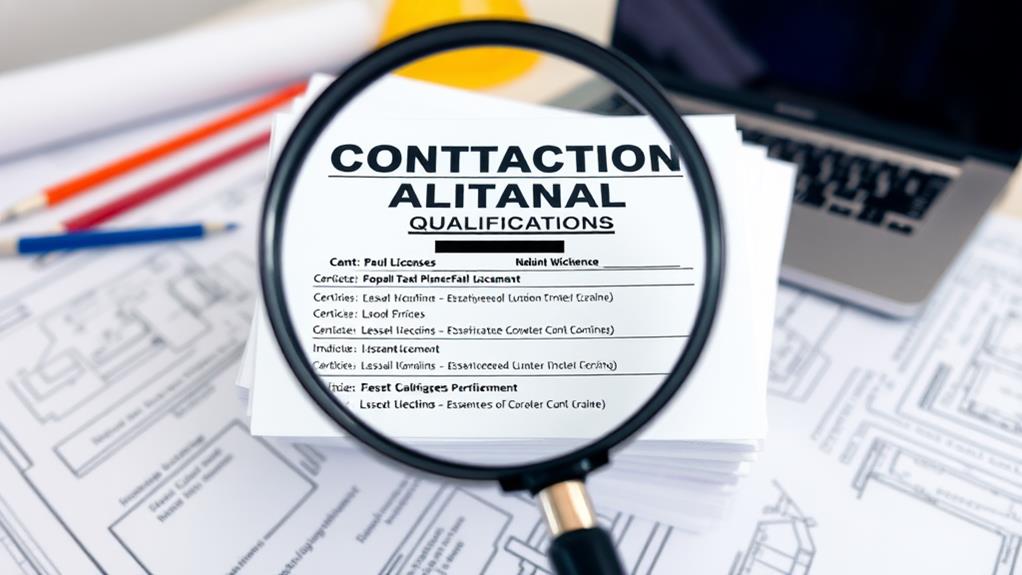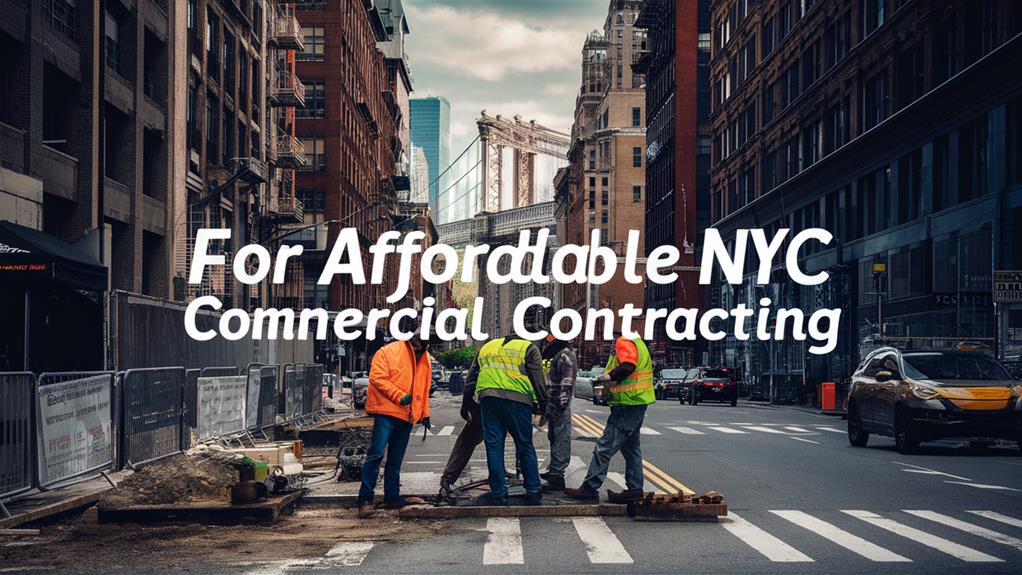When you're tackling commercial contracting in NYC, keep these ten tips in mind. First, verify contractor qualifications, including licensing and insurance. Next, gather multiple quotes to ensure price comparisons are accurate. Clearly assess your project scope to avoid surprises. It's vital to understand payment terms, tying them to project milestones. Evaluate the contractor's reputation through reviews and references. Thoroughly review all contracts, focusing on costs and timelines. Consider sustainable practices, which can save money. Don't overlook permitting delays by planning ahead. Lastly, maintain open communication with your contractor to ensure everything runs smoothly, and discover more insights along the way.
Research Contractor Qualifications

When researching contractor qualifications, it's crucial to ensure your potential commercial contractor has the right licensing and insurance. This protects you from potential liabilities and is a legal requirement in NYC.
Start by reviewing the contractor's portfolio to see completed projects similar to yours, which helps you assess their experience and expertise in commercial construction. A reputable contractor will often have a diverse range of projects, from office towers to retail spaces, demonstrating their capability in various settings.
Next, seek positive client references and testimonials. These can give you valuable insight into the contractor's reliability and track record for delivering high-quality work on time and within budget.
You should also verify the contractor's financial stability. Conducting credit checks or reviewing financial statements ensures they can handle project costs without issues, which is essential for effective project management.
Lastly, look for any relevant certifications from recognized industry organizations. These show a contractor's commitment to quality and adherence to industry standards.
Obtain Multiple Quotes
After narrowing down your list of qualified contractors, it's time to obtain multiple quotes. This step is crucial for your commercial construction project, especially in a dynamic environment like NYC where urban transformation is constantly occurring.
By gathering at least three detailed quotes, you can get a range of price estimates, helping you find the right contractor without overpaying. Each quote should outline the same scope of work and specifications, so you can make accurate comparisons.
When you compare quotes, pay attention to what's included. Ensure that labor, materials, and any potential hidden fees are clearly detailed. Be cautious of bids that are significantly lower than the others; they might signal a lack of quality or hidden costs that could arise later in the project.
To make your search for quotes easier, utilize online platforms and local business networks. These resources can help you connect with reputable contractors who've experience in similar commercial projects.
Obtaining multiple quotes not only helps you assess costs but also gives you leverage in negotiations. This way, you can confidently choose the best option for your needs while ensuring you stay within your budget.
Assess Project Scope Clearly

Defining your project scope clearly is essential for a successful commercial renovation in NYC. Effective project management is a cornerstone of success, as it helps avoid scope creep, which can inflate costs and extend timelines—crucial in a city where renovations can cost between $200 to $500 per square foot.
Here's how to assess your project scope effectively:
- Detail Your Requirements: Write down specific design specifications, materials, and timelines. This clarity allows contractors to provide accurate bids, supporting better budget management.
- Establish a Realistic Schedule: Understand that many first-time renovators underestimate project duration. By including a timeline in your scope, you can set achievable milestones that keep the project on track.
- Document Everything: Keep comprehensive records of the project scope. This documentation ensures clear communication among all stakeholders, helping everyone stay informed and aligned throughout the construction process.
Regularly revisiting and updating your project scope will help you manage any unforeseen changes.
Understand Payment Terms
Clarity in payment terms is just as important as defining your project scope. When you're working with a contractor in the construction industry, you need to know exactly when payments are due throughout the project. Effective project management ensures that payment terms are well-structured and tied to project milestones, keeping everything on track ensuring smooth execution.
It's essential to negotiate the payment structure that works best for you, whether it's a lump sum, cost-plus-fee, or guaranteed maximum price. This helps you manage your finances while ensuring the project aligns with your budget.
Make sure all potential costs, including materials and labor, are detailed in the contract. This way, you can avoid unexpected expenses that could derail your financial plan.
Don't forget about transparency in pricing. Request detailed written estimates from multiple contractors so you can compare payment terms and avoid hidden fees that might pop up later.
Lastly, be aware of the implications of late payments. Many contracts include penalties or interest charges, which can significantly increase your overall project cost. Understanding these payment terms can save you time, money, and stress in your commercial contracting journey.
Evaluate Contractor Reputation

Evaluating contractor reputation is crucial for ensuring a successful commercial project. A strong contractor reputation not only guarantees quality work but also reflects reliability and professionalism.
Here are three steps you can take to assess their reputation:
- Research Online Reviews: Look at platforms like Yelp and Google to see what previous clients say about the construction contractors you're considering. High ratings and positive experiences are good indicators.
- Seek Recommendations: Talk to industry peers and local businesses to get personal recommendations for reputable contractors. Those with proven track records are often more trustworthy.
- Investigate Past Complaints: Check for any legal disputes or complaints filed against contractors. This information can provide insight into their reliability.
Additionally, ask for references from previous clients to hear about their work quality and project management skills.
Don't forget to check if the contractor has workers compensation insurance, as this protects you in case of accidents on the job.
Prioritize Effective Communication
Effective communication is essential for the success of any commercial contracting project. To keep your renovation project on track, establish clear expectations for how often and in what ways you'll communicate with your contractor. Regular updates are crucial; the contractor must keep you informed to prevent misunderstandings and delays.
When selecting a contractor, assess their initial responsiveness to your inquiries. Quick and clear answers indicate their willingness to maintain an open dialogue during the project.
It's also important that the contractor is accessible for on-site meetings and consultations. This accessibility allows you to address concerns as they arise, ensuring everyone stays aligned.
Utilizing digital platforms and project management software can enhance transparency and coordination among all stakeholders. These tools allow for real-time collaboration, making it easier to share updates, documents, and feedback.
Review Contracts Thoroughly

A thorough review of your contract is crucial for a successful commercial contracting project. By taking the time to review contracts thoroughly, you can avoid misunderstandings and ensure that your contractor is responsible for their obligations.
Here are three key areas to focus on:
- Scope of Work and Timelines: Ensure the contract clearly outlines what work is to be done and the deadlines for completion. This helps you hold the contractor accountable and ensures they finish on time.
- Cost Estimates and Payment Schedules: Review the detailed estimates for all potential costs, including materials and labor. Understanding the payment schedule can prevent unexpected expenses that may arise during the project.
- Change Order Procedures: Pay attention to how any additional work or modifications will be handled and billed. Clear procedures in the contract can save you headaches later.
Consider Sustainable Practices
When you consider sustainable practices in your commercial contracting project, you're not just making an environmentally-friendly choice—you're also paving the way for significant long-term savings.
By incorporating energy-efficient systems, like LED lighting and high-efficiency HVAC units, you could reduce operational costs by 20-50% annually. That's a hefty saving that adds up over time.
Utilizing low-emission materials enhances indoor air quality and can help your project qualify for green building certifications, such as LEED.
These certifications not only showcase your commitment to sustainability but may also provide financial incentives and tax benefits.
Implementing efficient waste management strategies during construction can further cut costs.
Recycling construction debris can divert up to 90% of waste from landfills, minimizing disposal fees.
Plan for Permitting Delays

How can you avoid the headaches of permitting delays in your NYC commercial contracting project? Planning ahead is key. Here are three strategies to help you stay on track:
1. Start Early: Begin the permitting process as soon as possible. Many projects face delays due to late submissions or missing information.
The average time to obtain permits can range from 1-4 months!
2. Engage an Expediter: Hiring someone who knows the permitting process can make a big difference.
An expediter can help you navigate the complexities and ensure all documentation is correctly completed, potentially reducing permitting delays.
3. Add a Buffer: When you plan your project timeline, consider adding an additional 20-30% to account for unexpected holdups.
This extra time can be crucial to keep your project moving forward.
Additionally, when you find a contractor, make sure they understand the necessary safety protocols and permitting requirements.
Maintain Open Dialogue Throughout
Maintaining open dialogue throughout your NYC commercial contracting project is essential for success. Clear communication with your contractor can prevent misunderstandings and keep the project on track in the fast-paced NYC environment. Establishing expectations for how often you'll communicate helps everyone stay aligned on goals.
Regular progress updates from your contractor are crucial. They provide transparency and allow you to address any challenges that arise promptly. When you foster an open dialogue, you create a collaborative environment where concerns can be raised without hesitation, reducing the risk of costly delays or disputes.
Before starting the project, assess your contractor's initial communication style and responsiveness. This can give you insight into their willingness to maintain open lines of communication.
Additionally, utilizing digital communication platforms can enhance real-time collaboration, making sure all stakeholders are informed and engaged throughout the construction process.
Conclusion
By following these ten tips for affordable NYC commercial contracting, you're not just building a space; you're crafting a solid foundation for your business. Think of each step as laying a brick, ensuring stability and strength for what's to come. With careful research, open communication, and a clear understanding of your project, you can create a successful partnership with your contractor. Remember, a well-planned project today paves the way for a thriving tomorrow.


Leave a Reply